最新初中英语语法知识—动词的全集汇编
初中英语语法知识—情态动词的全集汇编(3)
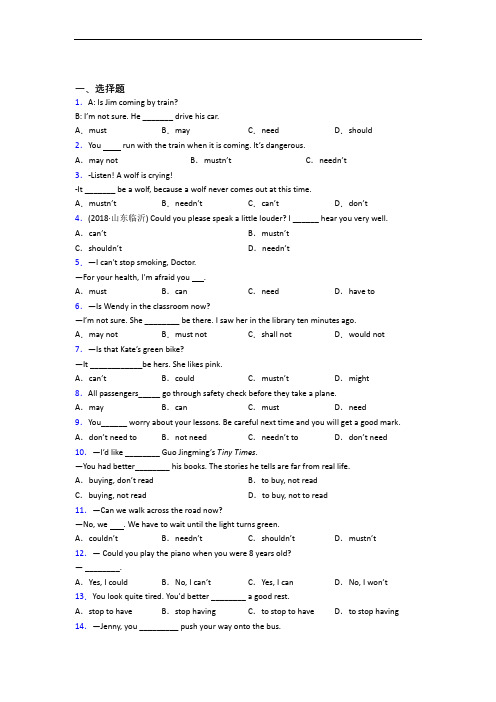
一、选择题1.A: Is Jim coming by train?B: I’m not sure. He _______ drive his car.A.must B.may C.need D.should 2.You run with the train when it is coming. It’s dangerous.A.may not B.mustn’t C.needn’t3.-Listen! A wolf is crying!-It _______ be a wolf, because a wolf never comes out at this time.A.mustn’t B.needn’t C.can’t D.don’t 4.(2018·山东临沂) Could you please speak a little louder? I ______ hear you very well. A.can’t B.mustn’tC.shouldn’t D.needn’t5.―I can't stop smoking, Doctor.―For your h ealth, I'm afraid you .A.must B.can C.need D.have to 6.—Is Wendy in the classroom now?—I’m not sure. She ________ be there. I saw her in the library ten minutes ago.A.may not B.must not C.shall not D.would not 7.—Is that Kate’s green bike?—It ____________be hers. She likes pink.A.can’t B.could C.mustn’t D.might8.All passengers_____ go through safety check before they take a plane.A.may B.can C.must D.need 9.You______ worry about your lessons. Be careful next time and you will get a good mark. A.don’t need to B.not need C.needn’t to D.don’t need 10.—I’d like ________ Guo Jingming’s Tiny Times.—You had better________ his books. The stories he tells are far from real life. A.buying, don’t read B.to buy, not readC.buying, not read D.to buy, not to read11.—Can we walk across the road now?—No, we . We have to wait until the light turns green.A.couldn’t B.needn’t C.shouldn’t D.mustn’t 12.— Could you play the piano when you were 8 years old?— ________.A.Yes, I could B.No, I can’t C.Yes, I can D.No, I won’t 13.You look quite tired. You'd better ________ a good rest.A.stop to have B.stop having C.to stop to have D.to stop having 14.—Jenny, you _________ push your way onto the bus.—I’m really sorry about it.A.mustn’t B.needn’t C.may not15.—Can I take some milk and biscuits to the reading room?—No, our school has a rule that students _______ eat or drink there.A.can’t B.mustn’t C.needn’t D.may not16.(江苏省无锡市锡北片2017届九年级下学期期中考试)—Where are you going for your summer holiday?—We go to Yun Nan, but we haven’t decided yet.A.should B.will C.may D.must17.— I would like________ to see a movie.—It’s too late. You’d better ________alone.A.to go, go B.go, not go C.to go, not go D.going, go 18.—Must I start now?—No, you_______________.A.mustn't B.can't C.needn't D.must19.—I feel tired.—You ________ go to bed so late.A.must B.shouldn’t C.should20.This book _____ Lucy’s. Look! Her name is on the book cover.A.must be B.may be C.can’t be D.mustn’t be 21.Everyone______ be polite to their parents.A.could B.may C.should D.can22.—________your house be cleaned right now?—No,it needn't.It may be cleaned this afternoon.()A.Must B.May C.Can【参考答案】***试卷处理标记,请不要删除一、选择题1.B解析:B【解析】【详解】句意:——吉姆坐火车来吗?——我不确定,他可能开自己的车。
(完整版)动词知识点总结

(完整版)动词知识点总结动词知识点总结
1. 动词的定义和作用
- 动词是表示动作、状态或行为的词语,可用于句子中的谓语部分。
- 动词可以表达时间、人称和数的变化,如一般现在时、一般过去时等。
- 动词可以表示肯定、否定、疑问等不同语气和句型。
2. 动词的时态和语态
- 动词的时态包括一般现在时、一般过去时、现在进行时、过去进行时、一般将来时等。
- 动词的语态包括主动语态和被动语态。
3. 动词的用法和语境
- 动词可以根据句子的需要使用不同的形式和短语,如不及物动词、及物动词、可分割动词等。
- 动词在句子中可以用来表示时间、原因、方式、目的等。
4. 动词的形式变化
- 动词的形式变化包括时态、人称和数的变化,特别是第三人称单数在一般现在时的变化。
- 动词还可以通过添加-ed或-d结尾来构成过去式和过去分词。
5. 动词的常见错误和困惑
- 动词的常见错误有时态误用、主谓一致错误等。
- 动词的困惑包括不同动词之间的区别和用法。
6. 动词的拓展研究
- 研究更多动词的用法和语境可以通过阅读英语教材、文章和参与语言研究课程来拓展自己的动词知识。
以上是对动词知识点的一个简要总结,希望对你有帮助。
初中英语语法知识梳理 ——动词
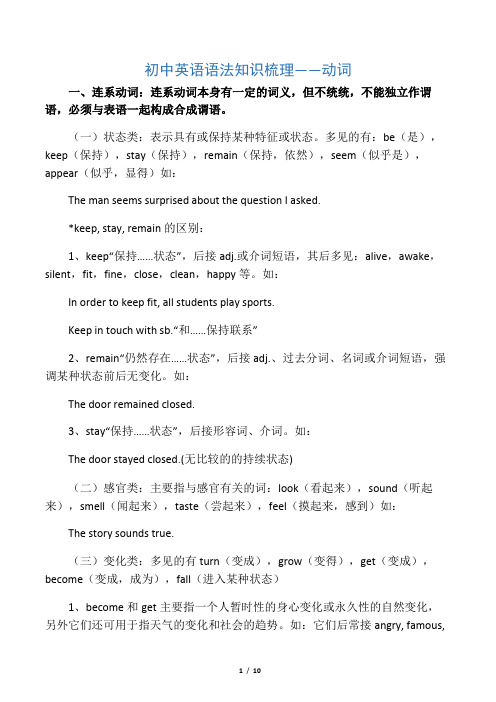
初中英语语法知识梳理——动词一、连系动词:连系动词本身有一定的词义,但不统统,不能独立作谓语,必须与表语一起构成合成谓语。
(一)状态类:表示具有或保持某种特征或状态。
多见的有:be(是),keep(保持),stay(保持),remain(保持,依然),seem(似乎是),appear(似乎,显得)如:The man seems surprised about the question I asked.*keep, stay, remain的区别:1、keep“保持……状态”,后接adj.或介词短语,其后多见:alive,awake,silent,fit,fine,close,clean,happy等。
如:In order to keep fit, all students play sports.Keep in touch with sb.“和……保持联系”2、remain“仍然存在……状态”,后接adj.、过去分词、名词或介词短语,强调某种状态前后无变化。
如:The door remained closed.3、stay“保持……状态”,后接形容词、介词。
如:The door stayed closed.(无比较的的持续状态)(二)感官类:主要指与感官有关的词:look(看起来),sound(听起来),smell(闻起来),taste(尝起来),feel(摸起来,感到)如:The story sounds true.(三)变化类:多见的有turn(变成),grow(变得),get(变成),become(变成,成为),fall(进入某种状态)1、become和get主要指一个人暂时性的身心变化或永久性的自然变化,另外它们还可用于指天气的变化和社会的趋势。
如:它们后常接angry, famous,ill, old, well, deaf, strong等。
如:get dressed穿衣服2、grow“渐渐变得……起来,长得”,主要表示逐渐变化,强调变化的过程。
初中英语动词知识点整理

初中英语动词知识点整理关于初中英语动词知识点整理初中英语的学习离不开各种时态、语态和句型,同学们要想提高英语成绩必须掌握好相关的知识点。
以下是关于初中英语动词知识点整理,让同学们学习参考:动词的分类及基本形式表示动作中状态的词叫做动词。
根据其在句中的功能,动词可分为行为动词、系动词、助动词和情态动词四类,有些动词是兼类词。
We have lunch at 12. 我们12点吃午饭。
(have是行为动词)We have been to New York. 我们去过纽约。
(have是助动词) W I am hungry. 我饿了。
(am是连系动词)She was beaten on the way home. 她在回家的路上被人打了。
(was是助动词)You needn’t have waited for me. 你本来不必等我。
(need是情态动词)The door needs painting. 这个门需要油漆了。
(needs及物动词) 动词的基本形式绝大多数动词都有五种基本形式:动词原形、一般现在时第三人称单数、过去式、过去分词和现在分词。
A. 第三人称单数形式的构成一般现在时主语是第三人称单数时,谓语动词后要加s或es,其变化规则与名词变复数的方法大体相同:1. 一般情况下只在动词后加s,如work—works, write—writes。
2. 以s, x, sh, ch结尾的动词,后加es,如guess—guesses, mix—mix, finish—finishes, catch—catches。
3. 以辅音字母加y结尾的动词,改y为ies,如study—studies。
注:不规则变化的有have—has, be—is, go—goes, do—does 等。
B. 现在分词的构成1. 一般情况下在动词后加ing,如study—studying, work—working。
2. 以不发音的字母e结尾的动词,先去掉e再加ing,如write—writing, move—moving。
初中常用动词用法总结
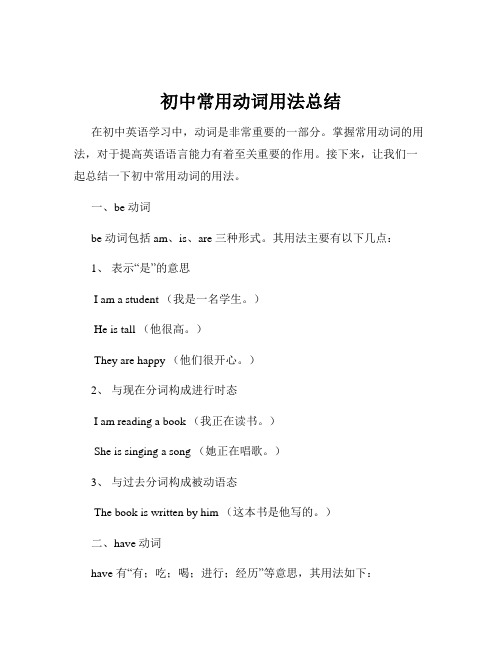
初中常用动词用法总结在初中英语学习中,动词是非常重要的一部分。
掌握常用动词的用法,对于提高英语语言能力有着至关重要的作用。
接下来,让我们一起总结一下初中常用动词的用法。
一、be 动词be 动词包括 am、is、are 三种形式。
其用法主要有以下几点:1、表示“是”的意思I am a student (我是一名学生。
)He is tall (他很高。
)They are happy (他们很开心。
)2、与现在分词构成进行时态I am reading a book (我正在读书。
)She is singing a song (她正在唱歌。
)3、与过去分词构成被动语态The book is written by him (这本书是他写的。
)二、have 动词have 有“有;吃;喝;进行;经历”等意思,其用法如下:1、表示“有”I have a pen (我有一支笔。
)They have many friends (他们有很多朋友。
)2、表示“吃;喝”Have some bread (吃点面包。
)Have a cup of tea (喝杯茶。
)3、与过去分词构成完成时态I have finished my homework (我已经完成了作业。
)三、do 动词do 用作实义动词时,表示“做;干”,用作助动词时,用于构成疑问句和否定句。
1、实义动词Do your homework (做你的作业。
)She does the dishes (她洗碗。
)2、助动词Do you like English? (你喜欢英语吗?)I don't know (我不知道。
)四、make 动词make 常见的意思有“制作;使;让”。
1、表示“制作”Make a cake (做一个蛋糕。
)2、表示“使;让”Make me happy (让我开心。
)五、take 动词take 有“拿;取;带走;花费”等意思。
1、表示“拿;取”Take this book (拿这本书。
初中英语动词的知识点总结

初中英语动词的知识点总结篇1:初中英语动词的知识点总结一、实义动词实义动词又叫行为动词,分成及物动词和不及物动词。
1、及物动词是必须带宾语的动词,可分为如下两类。
1) 及物动词+宾语例:I love my home. 我爱我家。
He bought an English dictionary. 他买了一本英语词典。
2) 及物动词+间接宾语+直接宾语例:She taught us maths. 她教我们数学。
My mother gave me a new pen. 母亲给了我一支新钢笔。
提示:常用的能接双宾语的及物动词有:give, teach, buy, lend, find, hand, leave, sell, show, read, pay, make, offer, build, pass, bring, cook等。
2、不及物动词不及物动词不需要跟宾语,本身意义完整。
例:She came last week. 她上周来的。
It is raining hard. 正下着大雨。
Class began at half past seven. 7点半开始上课。
What happened yesterday? 昨天发生了什么事?3、同一动词有时可用作及物动词,有时可用作不及物动词。
例如:She can dance and sing. 她能唱歌又能跳舞。
(sing 在此用作不及物动词。
) She can sing many English songs. 她能唱好多首英文歌曲。
(sing用作及物动词。
)二、系动词系动词不能单独作谓语,后面必须跟表语构成合成式谓语。
表语通常由名词、形容词,或相当于名词或形容词的词或短语等充当,说明主语是什么或怎么样。
连系动词有 be, seem, look, bee, get, grow, feel, appear, remain, turn。
例如: The story sounds true. Those oranges taste good.三、助动词协助主要动词构成谓语动词词组的词叫助动词。
最新初中英语语法大全+知识点总结(精编)

② 两人共有某物时 ,可以采用 A and B‘s的形式 ,如: Lucy and Lily ‘bsedroom(露西和丽 丽合住的卧室 )
③ “ of+名词所有格 /名词性物主代词” ,称为双重所有格 ,如: a friend of my father ‘(我s 父亲的一位朋友 ), a friend of mine(我的一位朋友 )
lives, knife→knives. 2、不规则变化: man→men, woman→ women, sheep→ sheep,tooth→ teeth, fish→ fish, child
→children, ox→ oxen, goose→ geese 不可数名词一般没有复数形式 ,说明其数量时 ,要用有关计量名词。 如:a bag of rice→two
(4)形容词→副词 ,如: early→ early, fast→ fast 等等。
(5)副词→连词 ,如: when(什么时候 )→ (当 …… 时候 ),等等。 (6)介词→副词 ,如: in(到 …… 里 )→ (在里面;在家 ),on(在 …上 )→ (进行 ,继续 ),等等。
二、名词:
1、英语名词可分专有名词和普通名词两大类:
here, often, quietly, slowly.
7、 冠词 (art..):用在名词前 ,帮助说明名词。如: a, an, the.
8、介词 ( prep.): 表示它后面的名词或代词与其他句子成分的关系。
如 in, on, from, above,
behind.
9、 连词 (conj.): 用来连接词、短语或句子。如 and, but, before .
▲ 不可数名词 是不可以用简单的数词进行计数的名词。如: water, news, oil, population,
初中英语知识点总结:动词知识点总结

初中英语知识点总结:动词知识点总结在初中英语的学习中,动词是一个至关重要的部分。
掌握好动词的相关知识,对于我们正确理解和运用英语句子有着不可或缺的作用。
接下来,就让我们一起深入地了解一下初中英语中动词的知识点。
一、动词的分类1、实义动词实义动词是表示具体动作或状态的动词,又可以分为及物动词和不及物动词。
及物动词后面需要接宾语才能表达完整的意思,例如“eat an apple (吃一个苹果)”中的“eat”就是及物动词,“apple”是宾语。
不及物动词后面不需要接宾语就能表达完整的意思,比如“run fast (跑得快)”中的“run”就是不及物动词。
2、系动词系动词用于连接主语和表语,说明主语的状态、性质、特征等。
常见的系动词有 be(am/is/are/was/were)、seem、look、sound、taste、feel、smell 等。
例如:“She is beautiful(她很漂亮。
)”“The soup tastes delicious(这汤尝起来很美味。
)”3、助动词助动词本身没有实际意义,主要用于帮助构成各种时态、语态、语气等。
常见的助动词有 do/does/did、have/has/had、will/would、shall/should 等。
比如:“He doesn't like sports(他不喜欢运动。
)”“They have finished their homework(他们已经完成了作业。
)”4、情态动词情态动词表示说话人的态度、情感或推测等。
常见的情态动词有can/could、may/might、must、need、shall/should、will/would 等。
例如:“You must study hard(你必须努力学习。
)”“Can you swim?(你会游泳吗?)”二、动词的时态1、一般现在时表示经常发生的动作或存在的状态。
当主语是第三人称单数时,动词要发生相应的变化,一般在动词词尾加 s 或 es。
初中英语语法大全动词的概述
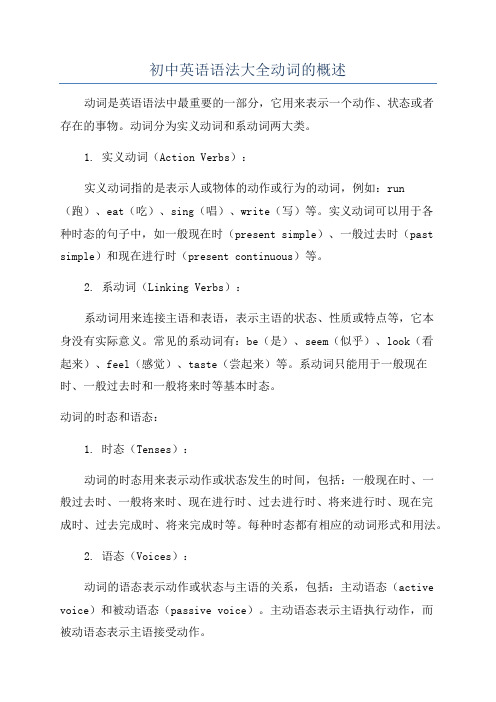
初中英语语法大全动词的概述动词是英语语法中最重要的一部分,它用来表示一个动作、状态或者存在的事物。
动词分为实义动词和系动词两大类。
1. 实义动词(Action Verbs):实义动词指的是表示人或物体的动作或行为的动词,例如:run (跑)、eat(吃)、sing(唱)、write(写)等。
实义动词可以用于各种时态的句子中,如一般现在时(present simple)、一般过去时(past simple)和现在进行时(present continuous)等。
2. 系动词(Linking Verbs):系动词用来连接主语和表语,表示主语的状态、性质或特点等,它本身没有实际意义。
常见的系动词有:be(是)、seem(似乎)、look(看起来)、feel(感觉)、taste(尝起来)等。
系动词只能用于一般现在时、一般过去时和一般将来时等基本时态。
动词的时态和语态:1. 时态(Tenses):动词的时态用来表示动作或状态发生的时间,包括:一般现在时、一般过去时、一般将来时、现在进行时、过去进行时、将来进行时、现在完成时、过去完成时、将来完成时等。
每种时态都有相应的动词形式和用法。
2. 语态(Voices):动词的语态表示动作或状态与主语的关系,包括:主动语态(active voice)和被动语态(passive voice)。
主动语态表示主语执行动作,而被动语态表示主语接受动作。
动词的形式变化:1.时态、人称和数的变化:动词的形式会根据时态、人称和数的不同而发生变化。
一般而言,动词在第三人称单数形式(he/she/it)中,要在词尾加上-s或-es,如:eat(吃)→ eats(吃),go(去)→ goes(去)。
2.动词的过去式和过去分词形式:大部分动词的过去式是在词尾加-ed,如:work(工作)→ worked (工作过)。
而过去分词的形式分为规则动词和不规则动词。
规则动词在词尾加-ed,如:played(玩过),而不规则动词则没有规则可循,如:gone(去过)。
动词英语知识点总结
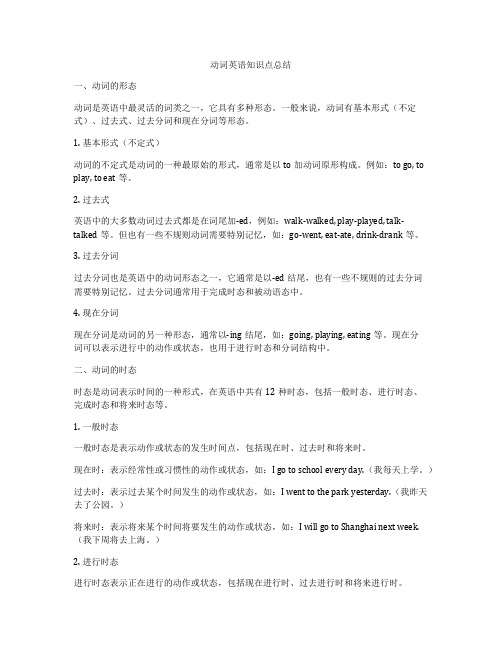
动词英语知识点总结一、动词的形态动词是英语中最灵活的词类之一,它具有多种形态。
一般来说,动词有基本形式(不定式)、过去式、过去分词和现在分词等形态。
1. 基本形式(不定式)动词的不定式是动词的一种最原始的形式,通常是以to加动词原形构成。
例如:to go, to play, to eat等。
2. 过去式英语中的大多数动词过去式都是在词尾加-ed,例如:walk-walked, play-played, talk-talked等。
但也有一些不规则动词需要特别记忆,如:go-went, eat-ate, drink-drank等。
3. 过去分词过去分词也是英语中的动词形态之一,它通常是以-ed结尾,也有一些不规则的过去分词需要特别记忆。
过去分词通常用于完成时态和被动语态中。
4. 现在分词现在分词是动词的另一种形态,通常以-ing结尾,如:going, playing, eating等。
现在分词可以表示进行中的动作或状态,也用于进行时态和分词结构中。
二、动词的时态时态是动词表示时间的一种形式,在英语中共有12种时态,包括一般时态、进行时态、完成时态和将来时态等。
1. 一般时态一般时态是表示动作或状态的发生时间点,包括现在时、过去时和将来时。
现在时:表示经常性或习惯性的动作或状态,如:I go to school every day.(我每天上学。
)过去时:表示过去某个时间发生的动作或状态,如:I went to the park yesterday.(我昨天去了公园。
)将来时:表示将来某个时间将要发生的动作或状态,如:I will go to Shanghai next week.(我下周将去上海。
)2. 进行时态进行时态表示正在进行的动作或状态,包括现在进行时、过去进行时和将来进行时。
现在进行时:表示当前正在进行的动作或状态,如:I am reading a book now.(我正在看书。
)过去进行时:表示过去某个时间点正在进行的动作或状态,如:I was watching TV when you called me.(你给我打电话时,我正在看电视。
通辽市初中英语语法知识—动词的全集汇编附解析
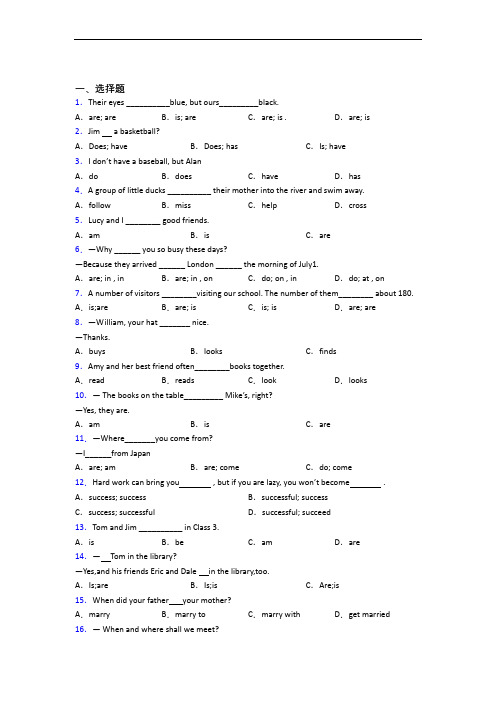
一、选择题1.Their eyes __________blue, but ours_________black.A.are; are B.is; are C.are; is . D.are; is2.Jim a basketball?A.Does; have B.Does; has C.Is; have3.I don’t have a baseball, but AlanA.do B.does C.have D.has4.A group of little ducks __________ their mother into the river and swim away.A.follow B.miss C.help D.cross5.Lucy and I ________ good friends.A.am B.is C.are6.—Why ______ you so busy these days?—Because they arrived ______ London ______ the morning of July1.A.are; in , in B.are; in , on C.do; on , in D.do; at , on7.A number of visitors ________visiting our school. The number of them________ about 180. A.is;are B.are; is C.is; is D.are; are 8.—William, your hat _______ nice.—Thanks.A.buys B.looks C.finds9.Amy and her best friend often________books together.A.read B.reads C.look D.looks 10.—The books on the table_________ Mike’s, right?—Yes, they are.A.am B.is C.are11.—Where_______you come from?—I______from JapanA.are; am B.are; come C.do; come12.Hard work can bring you , but if you are lazy, you won’t become . A.success; success B.successful; successC.success; successful D.successful; succeed13.Tom and Jim __________ in Class 3.A.is B.be C.am D.are14.— Tom in the library?—Yes,and his friends Eric and Dale in the library,too.A.Is;are B.Is;is C.Are;is15.When did your father your mother?A.marry B.marry to C.marry with D.get married 16.— When and where shall we meet?— Let's ________it half past nine.A.meet B.make C.do17.—Who are you _______? — My mother.A.wait B.waiting C.waiting for D.wait for 18.— How ________ your trip to Australia?—Great. I’ll go there again next year.A.was B.is C.are D.were19.I often play volleyball after class. But my cousin Lily _________.A.does B.doesn’t C.do D.don’t20.I don’t have a baseball, but my brother_________.A.is B.has C.does21.Nothing ______ difficult if you put your heart into it.A.is B.are C.am D.Be22.________your brother________ a baseball?A.Do; have B.Does; has C.Does; have D.Do; has 23.—How much ________ this pair of socks?—Two dollars for one pair.A.am B.is C.are24.2019 has come. I hope everyone can make his dream ________.A.came true B.come true C.comes true D.coming true 25.Speak louder, ________ you can’t make yourself________.A.and; hear B.or; hear C.and; heard D.or; heard【参考答案】***试卷处理标记,请不要删除一、选择题1.A解析:A【解析】【分析】【详解】句意:他们的眼睛是蓝色的,但是我们的眼睛是黑色的。
初中英语语法总结(全集)

初中英语语法总结(全集)1 (see 、hear 、notice 、find 、feel 、listen to 、look at ( 感官动词)+do eg:I like watching monkeys jump2 (比较级and 比较级)表示越来越怎么样3 a piece of cake =easy 小菜一碟(容易)4 agree with sb 赞成某人5 all kinds of 各种各样 a kind of 一样6 all over the world = the whole world 整个世界7 along with 同⋯⋯一道,伴随⋯⋯eg : I will go along with you 我将和你一起去the students planted trees along with their teachers 学生同老师们一起种树8 As soon as 一怎么样就怎么样9 as you can see 你是知道的10 ask for ⋯⋯求助向⋯要⋯(直接接想要的东西)eg : ask you for my book11 ask sb for sth 向某人什么12 ask sb to do sth 询问某人某事ask sb not to do 叫某人不要做某事13 at the age of 在⋯⋯岁时eg :I am sixteen I am at the age of sixteen14 at the beginning of ⋯⋯⋯⋯的起初;⋯⋯的开始15 at the end of + 地点/+时间最后;尽头;末尾e g : At the end of the day16 at this time of year 在每年的这个时候17 be /feel confident of sth /that clause + 从句感觉/对什么有信心,自信eg : I am / feel confident of my spoken English I feel that I can pass the test18 be + doing 表:1 现在进行时2将来时19 be able to (+ v 原) = can (+ v 原)能够⋯⋯eg : She is abl e to sing She can sing20 be able to do sth 能够干什么 eg :she is able to sing21 be afraid to do (of sth 恐惧,害怕⋯⋯eg : I'm afraed to go out at night I'm afraid of dog22 be allowed to do 被允许做什么eg: I'm allowed to watch TV 我被允许看电视I should be allowed to watch TV 我应该被允许看电视23 be angry with sb 生某人的气 eg : Don't be angry with me24 be angry with(at) sb for doing sth 为什么而生某人的气25 be as ⋯原级⋯as 和什么一样eg : She is as tall as me 她和我一样高26 be ashamed to 27 be away from 远离28 be away from 从⋯⋯离开29 be bad for 对什么有害eg : Reading books in the sun is bad for your eyes 在太阳下看书对你的眼睛不好30 be born 出生于 31 be busy doing sth 忙于做什么事be busy with sth 忙于⋯⋯32 be careful 当心;小心33 be different from ⋯⋯和什么不一样34 be famous for 以⋯⋯著名 35 be friendly to sb 对某人友好36 be from = come from 来自 eg :He is from Bejing He comes from Bejing Is he from Bejing ? Does he comefrom Bejing ?37 be full of 装满⋯⋯的be filled with 充满eg: the glass is full of water the glass is filled with water38 be glad+to+do/ 从句 39 be going to + v( 原)将来时40 be good at(+doing) = do well in 在某方面善长,善于⋯⋯41 be good for 对什么有好处eg : Reading aloud is good for your English42 be happy to do 很高兴做某事43 be helpful to sb 对某人有好处eg : Reading aloud is helpful to you 大声朗读对你有好处Exercising is helpful to your bady 锻炼对你的身体有好处44 be in good health 身体健康45 be in trouble 处于困难中eg : She is in trouble They are in tronble46 be interested in 对某方面感兴趣47 be late for = come late to 迟到eg: Be late for class 上课迟到48 be like 像⋯⋯eg : I'm like my mother49 be mad at 生某人的气50 be made from 由⋯⋯制成( 制成以后看不见原材料)51 be made of 由⋯⋯制成( 制成以后还看得见原材料) 52 be not sure 表不确定53 be on a visit to 参观54 be popular with sb 受某人欢迎55 be quiet 安静56 be short for 表** 的缩写e g: 陶is short for 陶俊杰57 be sick in bed 生病在床58 be sorry to do sth be sorry for sb eg : I am sorry for you59 be sorry to hear that 60 be sorry to trouble sb eg : I am sorry to trouble you61 be strict in doing sth 严于做某事eg : He's strict in obeying noles62 be strict with sb 对某人要求严格eg: Some students are not strict with them selves 这些学生对自己不严格63 be strict with sb in sth 某方面对某人严格64 be supposed to do 被要求干什么65 be sure 表确定66 be sure of doing sth 对做某事有信心eg: He is sure of winning I am sure of learningEnglish well67 be sure of sth 对做某事有信心eg: I'm sure of my head (my teacher 我相信我的大脑(老师)68 be sure that sth 对做某事有信心eg: I'm suer that he can pass the test 我相信他能通过考试69 be sure to do sth 一定会做某事eg: Weare sure to pass the test 我们一定会通过这次考试W e are sure to learn English well 我们一定能学好英语70 be terrified of + 名/动d oing 害怕⋯⋯71 be terrified to do sth 害怕做某事72 be the same as ⋯和什么一样73 be used to doing sth 习惯做某事eg: My father is used to getting up early 我爸爸习惯早H e is used to sleeping in class 他习惯上课睡觉74 be worth doing 值得做什么75 be(feel) afraid to do sth 害怕做某事be afraid of sth 害怕某物be afraid that 丛句76 because+句子because of + 短语eg : He was late because he had a headache He was late because of his headache77 begin to do = start to do 开始做某事start ⋯with ⋯=begin⋯with ⋯以什么开始什么eg : Let's begin the game with the song I begin to go home78 between⋯and⋯两者之间79 borrow sth from sb 向⋯⋯借⋯⋯lend sth to sb ( lend sb sth 借给⋯⋯什么东西eg : I borrowed a pen from him he lent a pen to me ( he lent me a pen80 both = the same(as) = not different(from) 表相同81 bother 打扰bother sb to do stheg : I'm sorry to bother you ,but can you tell me to way to the station我十分道歉打扰你,但是你能告诉我怎么去车站the problem has been bothering me for weeks 这个问题困扰了我几个周了He's bothering me to lend him money82 by the end of 到⋯⋯为止83 call sb sth eg : We call him old wang84 care 关心eg : Don't you care about this country's future ? 你为什么不关心国家的未来85 catch up with sb 赶上某人86 chat with sb 和某人闲谈take sb to + 地点带某人去某地87 come in进88 come over to 过来89 come up with 提出 eg: Can you come up with a good idea 你能想出一个好办法吗?90 communicate with sb 和某人交流91 consider + doing 考虑做什么 eg : Why not consider going to lu zhou 为什么不考虑去泸州?92 dance to 随着⋯⋯跳舞eg : She likes dancing to the music 她喜欢随着音乐跳舞93 decide to do sth 决定做某事 94 do a survey of 做某方面的调查95 do better in 在⋯⋯方面做得更好96 do wrong 做错97 Don't forget to do sth 不要忘了做某事98 Don't mind +doing / 从句 / 名词不要介意⋯⋯99 each + 名(单)每一个⋯eg : Each student has many books 每一个学生都有一些书100 end up +doing 101 enjoy+doing 喜欢 102 escape from 从⋯⋯逃跑eg: The prisoners have escaped from the prison 犯人从监狱里逃跑出来103 expect to do sth 期待做某事 104 fall down 摔下来 fall off 从哪摔下来 105 fall in love with sb /sth 爱上什么106 far from 离某地远e g : The school is far from my home 107 find +it +adj +to do 发现做某事怎么样108 find sb/sth +adj 发现什么怎么样e g : I find the book interesting 109 finish 完成+doing (名词)110 fit to sb = be fit for sb 适合某人 111 forget to do 没有做而忘了forget doing 做了而又忘了eg: Don't forget to go home I forget closing door 112 from ⋯ to⋯从某某到某某eg: From me for her113 get /have sth down 做完,被(别人)做⋯eg: I have my hair cut 我理了发 ( 头发被剪了)Tom got his bad tooth pulled out 汤母把他的坏牙拔掉了(被牙医拔掉了)114 get a part-time job= find a part-time job 115 get along well with sb = get on well with sb 与某人相处得好116 get along with sb = get on with sb 与某人相处 117 get ready for = be ready for 为什么而准备e g : I get ready for math I am ready for math 118 get sb in to trouble 给某人麻 119 get sb to do sth120 get ⋯ from⋯从某处得到某物121 give a talk 做报告e g: He is give a tall122 give sth to sb give sb sth 给某人某物123 go fish钓鱼go swimming 游泳124 go on to do 去做下一件事go on doing 继续做这件事125 go out away from go out of126 go to school 上学(用于专业的)go to the school 去学校(不一定是上学)127 good way to 好方法128 hate to do 讨厌没做过的事hate doing 讨厌做过的事129 have a party for sb 举办谁的晚会130 have a talk 听报告谈一谈131 have been doing 现在完成进行时eg : You have been talking You have been sleeping since132 have been to ⋯ ( 地方)⋯⋯去过某过地方have gone to ⋯(地方)去了某地还没回来133 have fun +doing 玩得高兴134 have sth to do 有什么事要做eg: I have a lot of homework to do 我有很多家庭作业要做I have nothing to do 我没什么事情做135 have to do sth 必须做某事136 have trouble (problem) (in) doing sth 做什么事情有麻烦137 have⋯ time +doing138 have⋯ ( 时间)⋯ off 放⋯⋯假eg: I have month off 我请一个月得假139 hear sb +do/doing 听见某人做某事 / 正在做某事140 help a lot 很大用处141 help sb with sth \one's sth 帮助某人某事(某方面)help sb (to) do sth 帮助某人做某事142 hope to do sth 希望做某事143 How about(+doing) = What about(+doing)144 how do you like = what do you think of 你对什么的看法145 if : 是否=wethereg: I don't know if (wether) I should go to the party 我不知道我是否应该去参加晚会He don't know if (wether) we will arrive on time tomorrow morning 他不知道我们明天早上是否能准时到达146 if : 如果,假如(全部接一般时态)+条件语态从句eg: I'll go to LuZhou if it does't rain 假如明天不下雨,我就去泸州If they change the plan they will let me know 假如他们要改变计划,他们会让我知道的I'll go to England ,if I have enough money next year 如果我明年由足够的钱,我就要去英国147 in one's opinion = sb think 某人认为148 in some ways 在某些方面149 in the end = finally(adv) 最后150 in the north of ⋯什么在什么的北方(north 北sowth 南west 西east东)151 in the sun 在太阳下152 increase 增加eg : They've increased the prece of petrol by 3% 他们把石油价增加了3%the population has increased from 12 million ten years ago to 18 million now153 instead of + (名)代替eg: I'd like an apple instead of a pear 我想要苹果,而不要梨子I like English instead of math 我喜欢英语而不喜欢数学154 introduce sb to sb 介绍某人给某人introduce oneself 自我介绍155 invite sb to do sth 邀请某人做某事156 It takes sb sometime to do sth 做某人花掉某人多少时间eg : It took me 5 minutes to do my homework It takes me half an hour to cook157 It's +adj +for sb to do sth 对某人来说做某事怎么样158 It's +adj +to do 做某事怎么样159 It's +adj for sb 对于某人来说怎么样I t's +adj of sb 对某人来说太怎么样160 It's +adj(for sb) to do (对某人来说)做某事怎么样I t's +adj of sb to do sth 对某人来说做某事太怎么样eg : It's nice of you to help me with my English161 It's a good idea for sb to do sth 对⋯⋯来说是个好主意162 It's important to sb 对某人来说很重要eg: It's important to me163 It's time to do sth It's time for sth 到了该去做某事的时间eg : It's time to have class It's time for class 该去上课了164 join = take part in 参加165 just now 刚才166 keep +sb /sth +adj / 介词短语让什么保持什么样?167 keep out 不让⋯⋯进入168 keep sb adj 让⋯⋯保持⋯⋯eg: I want to keep my mother happy keep healthy 保持健康169 key to + 名词表示:某物的钥匙或某题的答案170 key to ⋯anser to ⋯key 可以是答题或钥匙171 laugh at ⋯取笑⋯⋯eg : Don't langh at others We langhed at the joke172 learn by oneslfe 自学173 learn from sb 向某人学习e g: We should learn from Lei Feng174 learn to do sth 学做某事175 let sb do sth 让某人做某事176 Let sb down 让某人失望e g :We shouldn't let our farents down 我们不应该让我们的父母失望177 live from : 离某地远178 live in + 大地方/at + 小地方居住在某地eg: I live in LuZhou She lives at XuanTan179 look after = take care of 照顾照看180 lose one's way 谁迷路eg : Lose your way 你迷路181 make a decision to do sth 决定做某事182 make friends with sb 和谁成为朋友eg : I want to make friends with you183 make it early 把时间定的早一点184 make on exhibition of oneself 让某人出洋相185 make sb /n +n 使什么成为什么eg : I made her my step moller I made you my wife186 make sb /sth +adj 使某人(某物)怎么样e g : You must made your bed clean187 make sb /sth adj 使某人/ 某物怎么样188 make sb do sth 让某人做某事eg : I made him write 我以前让他写189 make up be made up of ( 被动语态)由⋯⋯组成190 make⋯ difference to ⋯191 mind sb to do mind one's doing 介意⋯⋯做什么192 most + 名most of + 代193 much too + 形容词 194 must be 一定195 need + 名词196 need sb do sth 需要某人做某事197 need to do ( 实义动词)need do ( 情态动词)198 no /neithr of hate to do no /neithr of hate doing199 no + 名词200 not anymore = no more 再也不⋯⋯eg: He didn't cry any more He cried no more 他再也不哭 201 not ⋯( 形、副)at all eg: He's not tall at all she doesn't junp far at all202 not ⋯ at all 一点都不203 not ⋯ either 表否定,也不eg : I don't japanse either I don't have sister, either 我也没有姐姐204 not ⋯ until 直到⋯⋯才⋯⋯eg: I didn't sleep until my mother came back The child didn't stop crying until I give her sugar205 offer / provide sb with sth 给某人提供206 offer sb sth ( offer sth to sb 提供什么东西给某人eg : I offer you water (I offer water to you 我给你提供水207 on one's way to ⋯在谁去那的路上208 on the one hand 一方面 on the other hand 另一方面209 on the phone = over the phone 用电话交谈210 on time 准时in time 及时211 one day =some day =someday 一天,有一天212 one of + 可数名词的复数形式213 one to another 一个到另一个214 over and over agin 一遍又一遍的eg : He cleaned the floor over and over agin215 part-time job 兼职工作f all-time job 全职工作216 pay for ⋯付⋯⋯钱p ay the bill 开钱,付钱217 please +do218 please help yourself219 pleased with sb220 pool into = pore into221 practice +doing 练习做某事222 prefer sth to sth 相对⋯⋯更喜欢⋯⋯eg : I prefer physics to chemisty 在物理和化学中,我更喜欢物理prefer doing to sth 更喜欢去做⋯不愿意去做⋯eg: He prefers riding a bike to diving 他更喜欢骑自行车,不开小车prefer to do sth rather than do sth 宁愿做⋯也不愿eg: My unde prefers to buy a now car rather than repaiv the used one 我叔叔更喜欢买新的车,也不去修旧车prefer sb not to do sth 更愿意⋯eg: I prefer her not to come 我不喜欢她不来223 pretend to do sth 装着去做什么pretend that 从句eg : The two cheats pretended to be working very hard 这两个骗子装着努力工作He pretended that he did not know the answer 他装着不知道答案224 rather ⋯ than 宁可⋯⋯也不⋯⋯eg : I would rather be a doctor than a teacher 我愿肯当医生,也不当老师He likes dogs rather than cats 他喜欢狗,不喜欢猫225 regard ⋯ as 把⋯⋯当作⋯⋯eg: Please give my best regards to your family 请带我向你的家人我最好的问候I regard you as my friend 我把你当作我的朋友He shows little regard for others 他不爱关心别人226 remid sb about sth 提醒某人什么事remid sb to do sth 提醒某人做某事eg : he remids me about cooking (he remids me to cook 他提醒我做饭227 remid sb of sth 使某人想起什么eg : the pictures remind me of my school days 这照片使我想起了我的学校the words that (which) the teacher talke to remind me of my mother228 return sth to sb 还什么东西给某人229 say to oneself 对自己说230 say to sb 对某人说231 sb spend somemoney on sth 花了多少钱在某事上232 sb spend sometime with sb 花了多少时间陪谁233 sb spend sometime(in) doing sth 花了多少时间做某事234 sb with sb +is sb and sb +are235 see sb do 看见某人做过某事see sb doing 看见某人正在做某事236 seem to do/be +adj 显得怎么样e g : You seem to be tired You seem to be happy237 send +sb sth 送给某人某物238 send⋯ to⋯把什么寄到哪里去?239 shock 使⋯⋯震惊 eg : Oh , It's only you ! You give me a shock 啊,是你呀!吓我一跳240 show sb sth 向某人展示某物eg : I show her the book.241 show sb sth = show sth to sb 拿什么东西给某人看eg: Show me your pen Show your pen to me242 show sth to sb 向某人展示某物eg : I show the book to her.243 some⋯ others ⋯一些⋯⋯另一些⋯⋯244 start ⋯ with ⋯从⋯⋯开始begin ⋯ with ⋯从⋯⋯开始245 stay away from 远离⋯⋯eg : We're told to stay away from the animals whe visiting the zoo 当我们参观zoo 时,我们要远离动物If you want to lose weight you'd better stay auay from the sweet food 徒工你想减肥,你最好远离甜食246 stop doing 停下正在做的事247 stop sb from doing sth 阻止某人做某事248 stop sb(from) doing 阻止某人做某事249 stop to do 停下正在做的事去做下一件事250 such + 名这样,这种251 suit sb 适合某人252 surprise sb 使某人惊奇to one's surprise 令某人惊奇253 take classes 上课254 take sb to 把某人带去 eg : I take you to the hospital255 take walks = take a walk =go for a walk 散步256 ①talk to对谁说e g : I talk to you ②talk with 和谁说eg : I talk with him③talk of 谈到eg : we talked of you ④talk about 谈论关于⋯⋯257 talk with sb 和某人说话258 teach sb sth 教某人做某事259 tell sb do sth 告诉某人做某事260 tell sb sth tell sb that 丛句t ell sb not to do sth tell a story261 tell sb sth 告诉某人某事262 tell sb to do sth 告诉某人做什么tell sb not to do sth 告诉某人不要做什么263 tell ⋯ from⋯264 thank you for +doing265 the same + 名词(doing)+as ⋯⋯266 the same ⋯ ( 名) ⋯ as as ⋯ (adj adv) ⋯ as 相同267 the way to do sth =the way of doing st 做某方面的方法 the way to + 地方去哪的路e g :Do you know the way to learn English Do you know the way of learning English268 the way to ⋯(地点)到哪的 269 too ⋯ to⋯太怎样而不能⋯⋯adj +enough to 足够⋯能⋯so ⋯ that + 丛句eg: He is too young to go to school = He is so young that he can't go to schoolHe is old enough to go to school =He is so old that he can go to school270 transalte ⋯⋯ into ⋯⋯把什么翻译成什么eg : Trasalte English into chinese271 travel with sb 和某人去旅游272 try one's best to do sth 尽某人最大的努力去做某事eg: I will try my bestto learn English well 273 try to do sth 想干什么,但没成功try doing sth 想干什么,已经做过了eg :He tried to climb 他想爬上去,但没成功He tried climbing 他想爬上去,已经做过了274 try ⋯试衣服h ave a try 试一下 275 turn down 开小←→turn up 开大276 turn off 关上←→turn on 打开 open 拆开 277 upside down 倒着278 visit to ⋯参观某个地方279 wait for sb 等某人!转载擅自注:版权归徐闯所有,未经本人同意唐诗宋词复习资料《唐诗宋词》( 高中)。
(易错题精选)初中英语语法知识—动词时态的真题汇编含答案(1)
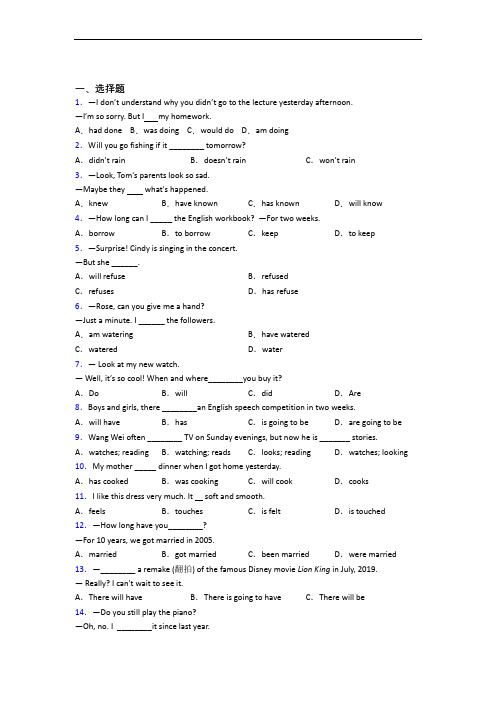
一、选择题1.—I don’t understand why you didn’t go to the lecture yesterday afternoon.—I’m so sorry. But I my homework.A.had done B.was doing C.would do D.am doing2.Will you go fishing if it ________ tomorrow?A.didn’t rain B.doesn’t rain C.won’t rain 3.—Look, Tom's parents look so sad.—Maybe they what's happened.A.knew B.have known C.has known D.will know 4.—How long can I _____ the English workbook? —For two weeks.A.borrow B.to borrow C.keep D.to keep 5.—Surprise! Cindy is singing in the concert.—But she ______.A.will refuse B.refusedC.refuses D.has refuse6.—Rose, can you give me a hand?—Just a minute. I ______ the followers.A.am watering B.have wateredC.watered D.water7.— Look at my new watch.—Well, it’s so cool! Whe n and where________you buy it?A.Do B.will C.did D.Are8.Boys and girls, there ________an English speech competition in two weeks.A.will have B.has C.is going to be D.are going to be 9.Wang Wei often ________ TV on Sunday evenings, but now he is _______ stories. A.watches; reading B.watching; reads C.looks; reading D.watches; looking 10.My mother _____ dinner when I got home yesterday.A.has cooked B.was cooking C.will cook D.cooks11.I like this dress very much. It soft and smooth.A.feels B.touches C.is felt D.is touched 12.—How long have you________?—For 10 years, we got married in 2005.A.married B.got married C.been married D.were married 13.—________ a remake (翻拍) of the famous Disney movie Lion King in July, 2019.— Really? I can't wait to see it.A.There will have B.There is going to have C.There will be 14.—Do you still play the piano?—Oh, no. I ________it since last year.A.didn’t play B.haven’t played C.don’t play15.—How much is the ticket (票) to Central Park?—One ticket $40, and you can $80 for two persons.A.costs; pay B.cost; spend C.pay; spend D.spends; pay 16.My mother when I got home yesterday.A.will cook B.cooks C.has cooked D.was cooking17.— Look after yourself on your way to Gungzhou,dear.— OK, mom.I will call you________get there.A.as soon as B.so that C.because18.Don’t turn on the TV. Grandma ________.A.sleeps B.is sleeping C.sleep D.are sleeping 19.We were in Qingdao last spring and _______ great fun there.A.is having B.are having C.had D.have20.It’s 8 o’clock. The students _________ an English class.A.have B.having C.is having D.are having 21.It’s not your turn yet. Please wait on the chair until you________.A.have called B.will call C.are calling D.are called 22.— Mum, where is Dad?— He _________ flowers in the garden now.A.planted B.plants C.will plant D.is planting 23.Could you please turn down your music? I________.A.work B.works C.am working D.worked 24.Though the number of family cars ________ growing in most cities, the bicycle is still a popular way of going to school or work.A.are B.is C.were D.was25.My mother will be very angry with me when she out where I have been.A.finds B.found C.will find D.has found【参考答案】***试卷处理标记,请不要删除一、选择题1.B解析:B【解析】【详解】句意:——我不明白你昨天下午为什么没有去听讲座?---对不起,我那时一直在做作业。
(完整版)初中英语语法知识点归纳
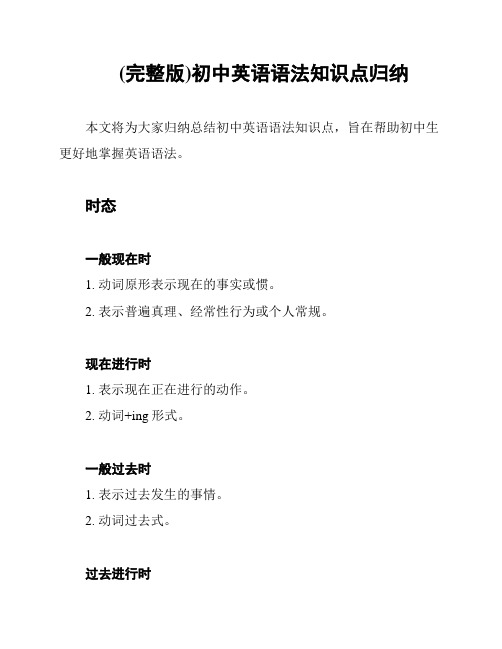
(完整版)初中英语语法知识点归纳本文将为大家归纳总结初中英语语法知识点,旨在帮助初中生更好地掌握英语语法。
时态一般现在时1. 动词原形表示现在的事实或惯。
2. 表示普遍真理、经常性行为或个人常规。
现在进行时1. 表示现在正在进行的动作。
2. 动词+ing形式。
一般过去时1. 表示过去发生的事情。
2. 动词过去式。
过去进行时1. 表示过去某个时间正在进行的动作。
2. was/were + 动词+ing形式。
一般将来时1. 表示将来的动作或状态。
2. will/shall + 动词原形。
语态主动语态1. 表示主语是动作的执行者。
2. 主语 + 动词原形。
被动语态1. 表示主语是动作的承受者。
2. be + 过去分词。
比较级与最高级比较级1. 用于比较两个人或物。
2. 形容词 + er。
最高级1. 用于比较三个或更多人或物。
2. 形容词 + est。
祈使句祈使句1. 表示请求、命令、建议或劝告。
2. 动词原形。
倒装句倒装句1. 将助动词或情态动词提前至主语之前。
2. 系动词be的倒装句:is/am/are/was/were + 主语。
直接引语与间接引语直接引语1. 直接引用他人的话。
2. 用引号将原话括起来。
间接引语1. 用自己的话转述他人的话。
2. 没有引号。
以上是初中英语语法的主要知识点归纳。
希望这份文档能够帮助到您更好地学习和掌握英语语法知识。
初中英语语法大全(精华版)

初中英语语法大全(精华版)一、动词时态1. 一般现在时:表示经常性、习惯性的动作或状态。
例如:He goes to school bike every day.(他每天骑自行车上学。
)2. 一般过去时:表示过去某个时间里发生的动作或存在的状态。
例如:She visited her grandparents last weekend.(她上周末去看望了她的祖父母。
)3. 一般将来时:表示将来要发生的动作或状态。
例如:We will have a sports meeting next month.(下个月我们将举行一场运动会。
)4. 现在进行时:表示正在进行的动作或状态。
例如:The boy is reading a book in the library.(这个男孩正在图书馆看书。
)5. 过去进行时:表示过去某个时刻正在进行的动作或状态。
例如:They were watching TV when I called them last night.(昨晚我给他们打电话时,他们正在看电视。
)6. 现在完成时:表示过去发生的动作对现在造成的影响或结果。
例如:I have finished my homework.(我已经完成了我的家庭作业。
)二、名词1. 名词的分类:名词分为可数名词和不可数名词。
可数名词有单数和复数形式,不可数名词没有复数形式。
2. 名词的数:可数名词的复数形式通常在词尾加s或es。
例如:books(书),pencils(铅笔)。
3. 名词的所有格:表示某物属于某人或某事物的关系。
例如:Tom's book(汤姆的书),the teacher's desk(老师的桌子)。
三、冠词1. 不定冠词:a和an。
a用于辅音音素开头的单词前,an用于元音音素开头的单词前。
例如:a dog(一条狗),an apple(一个苹果)。
2. 定冠词:the。
表示特指,指某个特定的人或事物。
初中英语语法动词(汇总8篇)

初中英语语法动词(汇总8篇)初中英语语法动词第1篇like to do sth / like doing 喜欢做某事love to do sth / love doing 喜欢做某事hate to do sth / hate doing 憎恨做某事prefer to do sth / prefer doing 宁可做某事begin to do sth / begin doing 开始做某事continue to do sth / continue doing 继续做某事can’t bear to do sth / can’t bear doing 不能忍受做某事 bother to do sth / bother doing 麻烦做某事intend to do sth / intend doing 打算做某事attempt to do sth / attempt doing 试图做某事cease to do sth / cease doing 停止做某事初中英语语法动词第2篇在句子中起着不同语法作用的部分,叫做句子成分。
英语的句子成分有九种:主语(subject→S)表示句子描述的是“谁”或“什么”,是谓语的陈述对象,通常由名词、代词、动词不定式、动名词或从句等担任:The book is on 书在桌子上。
(注:主语是“the book”)谓语动词(predicate verb)简称谓语,说明主语的动作或状态;由动词或动词短语担任:I love 我喜欢英语。
(注:谓语是“love”)表语(predicative→P)说明主语的性质、特征、状态或身份,与连系动词一起构成复合谓语、通常由名词、代词、形容词、数词、副词、介词短语、动词不定式、动名词、分词或从句等担任:I am 我是中国人。
(注:表语是“Chinese”)宾语(object→O)表示及物动词或及物动词短语的对象或内容,或用于介词后构成介宾短语;通常由名词、代词、数词、动词不定式、动名词或从句等担任:(注:及物动词+宾语;介词+宾语)We love 我们热爱英语。
初中英语语法——动词(MISS TAN 整理)
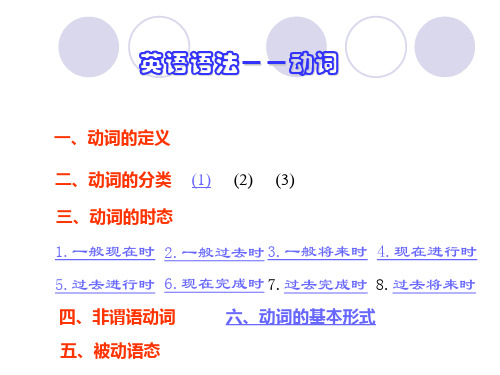
动词的基本形式
英语动词有五种基本形式。它们是动词原形、 第三人称单数现在时(简称单三)、过去 式、过去分词和现在分词。这五种形式和 助动词一起构成英语的各种时态和语态等。 例如:
原形
work write have do
第三人称单数
works writes has does
过去式
worked wrote had did
助动词
①常见的助动词有: 用于进行时和被动语态的be (am, is, are ,was, were, been, being ) ; 用于完成时的have(has,had,having) ; 用于将来时的shall (should) ; will (would) 用于一般时的do(does,did) . ②助动词必须同主语的人称和数一致,也就是说因 主语人称、数的不同而采用不同的形式,其中有些 助动词也可作情态动词。如:shall, will, should, would.
过去分词
worked written had done
现在分词
working writing having doing
变化规律
原形动词结尾情况 一般情况 s,x,ch,sh,o结尾 辅音字母+y结尾 重读闭音节一元一辅 结尾 不发音的e结尾 ie结尾 不规则变化 现在时单三人称 +s +es y→i,+es +s +s +s have→has; be→is 现在分词 +ing +ing +ing 双写辅音字母,+ing 去掉e,+ing ie→y,+ing (无) 过去式和过去分词 +ed +ed y→i,+ed 双写辅音字母,+ed +d +d (见不规则动词变化 表)
初中英语语法知识点大全

初中英语语法知识点大全一、时态1.一般现在时2.一般过去时3.一般将来时4.现在进行时5.过去进行时6.将来进行时7.现在完成时8.过去完成时9.将来完成时二、动词1.动词的基本形式2.动词的第三人称单数形式3.动词的过去式形式4.不规则动词的变化形式5.动词的进行式形式6.动词的完成式形式7.动词的被动语态形式8.动词的否定形式9.动词的疑问形式10.动词的反身形式三、名词1.可数名词2.不可数名词3.单数名词4.复数名词5.特殊复数名词6.形容词作名词7.名词所有格8.名词的单复数形式9.名词的特殊变化形式四、形容词和副词1.形容词的基本用法2.形容词的比较级和最高级3.形容词的位置4.副词的基本用法5.副词的比较级和最高级7.形容词和副词的区别五、代词1.主格代词2.宾格代词3.形容词性物主代词4.名词性物主代词5.指示代词6.反身代词7.不定代词六、冠词和数词1.定冠词2.不定冠词3.零冠词4.数词的基本形式5.数词的序数形式6.数词的基数和序数的用法七、介词1.介词的基本用法3.介词短语4.介词的特殊用法八、连词1.并列连词2.从属连词3.连词的位置九、时态和语态1.时态的选择2.时态的转换3.语态的转换十、虚拟语气1.虚拟语气的基本用法2.虚拟语气的特殊用法十一、直接引语和间接引语1.直接引语和间接引语的基本用法2.直接引语和间接引语的标点符号十二、定语从句和状语从句1.定语从句的引导词2.定语从句的构成3.状语从句的种类4.状语从句的引导词十三、条件状语从句和时间状语从句1.条件状语从句的引导词2.条件状语从句的构成3.时间状语从句的引导词4.时间状语从句的构成十四、目的状语从句和结果状语从句1.目的状语从句的引导词2.目的状语从句的构成3.结果状语从句的引导词4.结果状语从句的构成十五、比较状语从句和让步状语从句1.比较状语从句的引导词2.比较状语从句的构成3.让步状语从句的引导词4.让步状语从句的构成。
初中英语语法知识点整理总结-动词

初中英语语法知识点整理总结-动词动词是句子的中心词,用来表示人或物的动作、状态、变化等。
掌握动词的正确使用对于研究英语语法至关重要。
以下是初中英语动词知识点的整理总结:1. 动词的分类- 及物动词:表示动作的动词,需要带宾语才能构成完整的意义。
例如:read(读),eat(吃)。
- 不及物动词:表示动作的动词,不需要带宾语。
例如:run (跑),sleep(睡觉)。
- 连系动词:表示状态的动词,连接主语和表语,没有实际意义。
例如:be(是),seem(似乎)。
2. 动词的时态- 现在时:表示目前正在进行的动作或状态。
例如:I read a book.(我正在读一本书。
)- 过去时:表示过去发生的动作或状态。
例如:She ate an apple yesterday.(她昨天吃了一个苹果。
)- 将来时:表示将来要发生的动作或状态。
例如:They will go to the zoo tomorrow.(他们明天会去动物园。
)3. 动词的语态- 主动语态:表示主语是动作的执行者。
例如:Jim cleans the room.(吉姆打扫房间。
)- 被动语态:表示主语是动作的承受者。
例如:The room is cleaned by Jim.(房间被吉姆打扫了。
)4. 动词的情态- can:表示能力或许可。
例如:She can swim.(她会游泳。
)- must:表示必须。
例如:You must finish your homework.(你必须完成你的作业。
)- should:表示建议或义务。
例如:You should help others.(你应该帮助别人。
)以上是初中英语动词的一些基本知识点,希望对你的研究有所帮助。
初中英语语法大全动词的概述

初中英语语法大全动词的概述动词是英语语法中最重要的一类词性,用于表达动作、状态、存在、感受等。
以下是对动词的概述:1.动词的分类:- 主动词(main verbs):单独作谓语的动词,用于句子的主要动作或状态表达。
- 助动词(auxiliary verbs):用于表示时态、语态和情态等方面的辅助动词,与主动词连用构成谓语。
- 情态动词(modal verbs):用于表示情态或推测等含义的一类特殊助动词。
2.动词的时态:- 现在时态(Present Tense):表示现在时发生的动作或状态。
- 过去时态(Past Tense):表示过去时发生的动作或状态。
- 将来时态(Future Tense):表示将来时发生的动作或状态。
3.动词的语态:- 主动语态(Active Voice):表示主语是动作的执行者。
- 被动语态(Passive Voice):表示主语是动作的承受者。
4.动词的语气:- 直陈语气(Indicative Mood):表示陈述、肯定或疑问等。
- 祈使语气(Imperative Mood):表示命令、请求或建议等。
- 虚拟语气(Subjunctive Mood):表示假设、愿望或建议等。
5.动词的变位:- 原形(base form):动词最基本的形式,通常以不定式形式出现,如"to do"。
- 现在分词(present participle):以-ing结尾的动词形式,用于进行时态、被动语态等,如"doing"。
- 过去分词(past participle):通常以-ed、-en或不规则形式结尾的动词形式,用于完成时态、被动语态等,如"done"。
动词在句子中起到非常重要的作用,根据不同的时态、语态、语气等来正确使用动词,可以使句子更加准确和流畅。
- 1、下载文档前请自行甄别文档内容的完整性,平台不提供额外的编辑、内容补充、找答案等附加服务。
- 2、"仅部分预览"的文档,不可在线预览部分如存在完整性等问题,可反馈申请退款(可完整预览的文档不适用该条件!)。
- 3、如文档侵犯您的权益,请联系客服反馈,我们会尽快为您处理(人工客服工作时间:9:00-18:30)。
一、选择题1.—Would you like to try some pizza?—Yes, please. It lovely and nice.A.sounds, sees B.looks, smells C.hears, turns D.sounds, watches 2.In the past he often made his sister____, but now he is often made ___by his sister.A.to cry; to cry B.cry; cryC.to cry; cry D.cry; to cry3.These chicken wings taste ________. I want more.A.well B.wonderfully C.nice D.bad4.Parents always hope their children a happy and healthy life.A.to live B.can live C.living D.should live 5.The teacher's smile made me ________ better.A.feel B.to feel C.feeling D.felt6.—Listen! I can hear someone __________ for help.—Is there __________?A.calling; anything wrong B.call; anything wrongC.calling; wrong anything D.call; wrong anything7.—_______everyone get tired today?—Yes, we_______very tired the whole afternoon.A.Does; are all B.Do; are allC.Does; all are D.Is; all are8.The library ______ from 8 a.m. to 3 p.m. on weekdays. But it______ at 5 p.m. on Saturdays and Sundays.A.is open; closes B.opens; closed C.is opened; closes D.is opening; is closed 9.Which of the following sentences is right?A.My books on the desk B.Nice meet you, tooC.These are my dictionaries D.Thanks you for your help.10.—When you free last week?— Well, I have a free day because there was too much work.A.did; didn’t B.were; didn’t C.were; wasn’t D.did; wasn’t 11.The shopping mall near our school _________ for 12 hours a day. It _________ at 9:00 p.m.. A.opens; closes B.opens; is closed C.is open; is closed D.is open; closes 12.Hard work can bring you , but if you are lazy, you won’t become . A.success; success B.successful; successC.success; successful D.successful; succeed13.—Where_______you come from?—I______from JapanA.are; am B.are; come C.do; come14.—How much ________ this pair of socks?—Two dollars for one pair.A.am B.is C.are15.— What kind of home do you ? — A flat three bedrooms.A.live in; with B.live; with C.live in; has D.live; has16.I have bought a Chinese – English dictionary. When and where_____ you _____ it? A.have, bought B.did buy C.will, buy D.do , buy 17.In fact (事实上), she ________ ________ many ________.A.doesn’t has; toies B.don’t has; toies C.doesn’t have; toys D.don’t have; toys 18.Our teachers always make us ________ a lot of homework.A.to do B.do C.does D.doing 19.— How ________ your trip to Australia?—Great. I’ll go there again next year.A.was B.is C.are D.were 20.The water ______ cool when I jumped into the pool for morning exercise.A.was felt B.is felt C.felt D.feels21.—I saw Betty go to Grandpa Zhang’s home just now.—Yes, she is often seen ________ the old man with his housework.A.help B.to help C.helps D.helped 22.As we all know, the Anti-Japanese War ________ in 1937, and ________ for eight years. A.was broken out; lasted B.broke into;lastedC.broke out; was lasted D.broke out;lasted23.I don’t have a baseball, but my brother_________.A.is B.has C.does24.________your brother________ a baseball?A.Do; have B.Does; has C.Does; have D.Do; has 25.—The books on the table_________ Mike’s, right?—Yes, they are.A.am B.is C.are【参考答案】***试卷处理标记,请不要删除一、选择题1.B解析:B【解析】【分析】【详解】句意:——你想尝尝披萨吗?——好的,请。
它看起来很不错,闻起来很香。
考查感官动词。
sounds动词,听起来;see动词,看见;looks动词,看上去;smells动词,闻上去;hears动词,听见;turns动词,变成,转动;watches动词,观看。
根据空白后有lovely和nice均为形容词,感官动词可作系动词,后使用形容词作表语,构成系表结构。
此处some pizza还没有品尝,只能先“看”和“闻”,故选B。
2.D解析:D【解析】【分析】考点:非谓语动词【详解】句意:在过去,他经常把妹妹弄哭,但是现在他经常被妹妹弄哭。
make sb do sth使某人做某事;sb be made to do sth某人被使得做某事。
3.C解析:C【解析】【详解】句意:这些鸡翅尝起来不错。
我想要更多。
考查感官动词的用法及形容词辨析。
well好,副词;wonderfully精彩地;nice好的;bad 坏的。
taste是感官系动词,其后接形容词作表语,排除AB;根据题干中“I want more.”可知鸡翅尝起来很好,排除D。
故选C。
4.B解析:B【解析】【详解】句意:父母总是希望他们的孩子能过得健康快乐。
考查宾语从句。
hope后要么直接接动词不定式作宾语,要么接宾语从句。
此处是省略引导词that的宾语从句,此处缺从句的谓语,所以用情态动词+动词原形作谓语,又此处不构成虚拟语气,所以排除D,故选B。
5.A解析:A【解析】【详解】句意:老师的微笑使我感觉好多了。
考查动词的固定搭配,feel感觉;to feel(feel的不定式);feeling(feel的动名词);felt (feel的过去式和过去分词)。
分析句子结构,本题考查make sb do sth使某人做某事。
所以用不带to的不定式。
故选A。
解析:A【解析】【详解】句意:——听!我听见有人在呼救。
——有什么不对劲吗?考查感官动词和形容词做定语修饰不定代词的用法。
听到某人干某事hear sb do/doing sth;根据句中Listen!听的提示,说明听到的动作正在进行,所以感官动词hear应用hear sb doing sth结构,故排除B、D项;当有形容词wrong修饰不定代词anything时,形容词必须后置,故排除C项,故选A。
7.A解析:A【解析】【详解】句意:——今天大家都累了吗?——是的,整个下午我们都非常累。
考查助动词和不定代词。
Does助动词,用于主语为第三人称单数时;Do助动词;Is系动词;all是不定代词,应放在be动词之后,实意动词之前。
第一句话中get tired是动词短语,疑问句应用助动词构成,且主语everyone是不定代词,动词用单数,排除B和D;再根据all在句中的位置可知C不对,故选A。
8.A解析:A【解析】【详解】句意:图书馆平日里从早上8点开到下午3点是开着的。
但是它在星期六和星期天下午5点关门。
考查形容词和动词辨析。
is open开着的;closes关闭;opens打开;closed关闭;is opened 被打开;is opening即将开业;is closed关着的。
根据第一句中“from 8 a.m. to 3 p.m. onw eekdays”可知,此处是“在平日里早上8点到下午3点这个时间段内,图书馆是开着的”,所以此处用系表结构表示图书馆是开着的这个状态,所以第一空使用is open;第二句句中“at 5 p.m. on Saturdays and Sundays”是“时间点”,表示“在五点关门”,句中主语是it,所以第二空使用动词close的第三人称单数形式closes。
